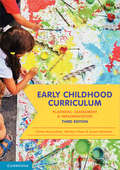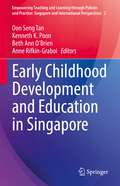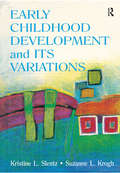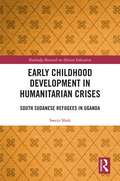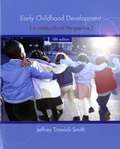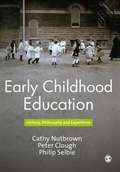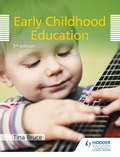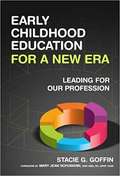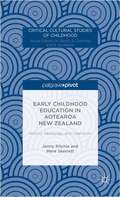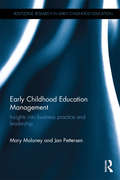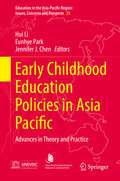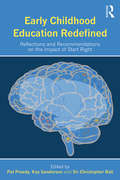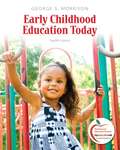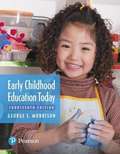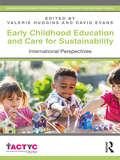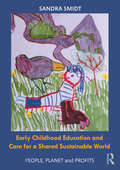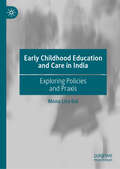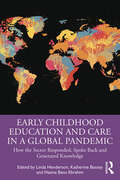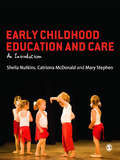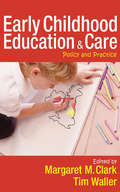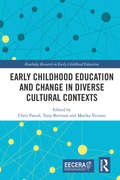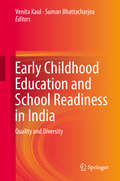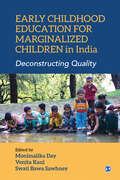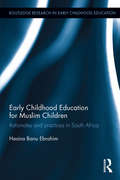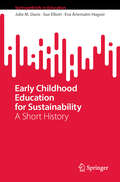- Table View
- List View
Early Childhood Curriculum: Planning, Assessment, and Implementation (3rd Edition)
by Susan Edwards Marilyn Fleer Claire McLachlanThe third edition of Early Childhood Curriculum provides a comprehensive and accessible introduction to curriculum theories and approaches in early childhood and early primary settings. Drawing on a cultural-historical framework for education, the text explores a variety of approaches to learning and teaching and equips readers with the tools to effectively plan, design and implement curriculum strategies. Thoroughly revised and updated, this edition features up-to-date coverage of national curriculum documents, including the Early Years Learning Framework and Te Whāriki, and expanded content on play-based curriculum, assessment and documentation. Key domain areas of the curriculum are explored in depth and have been revised to include updated discussions of environmental factors, digital knowledge and multiliteracies. Each chapter is enriched with learning intentions, definitions of key terms, reflection points, links to current curriculum documents and illustrative case studies to help readers connect theory to practice. An updated companion website, www.cambridge.edu.au/academic/earlychildhood, features new supplementary materials for students and instructors. Written by a team of highly respected and experienced Australian and New Zealand authors, Early Childhood Curriculum continues to be an essential resource for pre-service teachers and practitioners.
Early Childhood Development and Education in Singapore (Empowering Teaching and Learning through Policies and Practice: Singapore and International Perspectives #2)
by Oon Seng Tan Kenneth K. Poon Beth Ann O’Brien Anne Rifkin-GraboiThis book presents a holistic view of child development that emphasises on being mindful of the child as well as his/her environment. It presents a history of the development of the early childhood education sector in Singapore. This book consolidates the more recent research work that has been done in early childhood education, specifically by researchers from the National Institute of Education, Singapore. It discusses topics focusing on child development and education, teacher training and wellbeing, and the development of culturally appropriate assessment. The content of this book center around the child, with a consideration of influences in the environment that can impact child development.
Early Childhood Development and Its Variations
by Kristine SlentzProvides an overview of development, then describes principles and sequences of physical, cognitive, and social/emotional development at the infant, toddler, preschool, and primary levels. Individual differences and developmental norms are stressed throughout.
Early Childhood Development in Humanitarian Crises: South Sudanese Refugees in Uganda (Routledge Research on African Education)
by Sweta ShahThis book provides an analysis of Early Childhood Development (ECD) in South Sudanese refugee camps in Uganda, making the case for the design and implementation of programmes for ECD in emergency situations. Illustrating the current place of ECD in the humanitarian landscape and the environment in which South Sudanese refugees in Uganda currently live, this book combines child and human development perspectives to underpin the importance of ECD in emergencies. Developing an ECD tool specific to the cultural context and emergency situation, the author examines the outcomes of an ECD programme focused on refugee children and provides evidence for increased investment into ECD in emergencies. Contributing to the evidence base for Early Childhood Development, this book will be of interest to students, scholars and practitioners who conduct research on ECD, education or humanitarianism in developing countries.
Early Childhood Development: A Multicultural Perspective
by Jeffrey W. Trawick-SmithEarly Childhood Development: A Multicultural Perspective, Fifth Edition addresses both typical and atypical child development from birth through age eight. This text highlights the diversity of child development, preparing professionals to meet the unique needs of children from a wide variety of backgrounds.
Early Childhood Education
by Cathy Nutbrown Peter Clough Philip SelbieThis book provides original accounts of twelve research studies in early childhood settings and a discussion of key issues in early childhood education research. It focuses first on learning in the foundation stage and then on working with difference and diversity in preschool settings. Key themes are teaching and learning and the issues which affect them in the early years. The contributors also identify methodological concerns in researching early childhood education and offer suggestions for further progress. Contents include: Researching early childhood education in the 21st century; Quality in teaching and learning; Assessing mathematics; Well-being and involvement; Work with families; Children's early writing; gender issues; Persona dolls; Managing behaviours and children's rights; Children's experiences of inclusion; Early excellence in the community, baseline assessment, Researching the future. The book is designed to help students researching in the field of early childhood education and also practitioners who want to put research findings to use. The contributors include Sue Allingham, Tracey Berry, Julie Bravery, Debbie Critchley, Di Chilvers, Polly Dyer, Gill Farmer, Vicky Grant, Ramona Kahn, Anne Kirkpatrick, Christine Parker, Nicky Walters and Sue Webster. The editor, Cathy Nutbrown, directs the MA in Early Childhood Education at the University of Sheffield.
Early Childhood Education 5th Edition
by Tina BruceSuitable for a wide range of Early Years and Childcare qualifications, this new edition of Tina Bruce's classic text will help build students' practical skills by drawing on the history of Early Years and the most recent educational theories. Now in its 5th edition, this trusted resource written by experienced and respected childcare author Tina Bruce has been updated to include the most recent theories and research, including new studies on language acquisition, attachment theory and self-regulation. Early Childhood Education 5th Edition is the perfect textbook for a wide range of Early Years and Childcare qualifications including BA Hons in Early Years Education and Early Childhood Studies, PGCEs and Foundation Degrees. - Gives a detailed overview of education principles in early childhood, all outlined in Tina Bruce's clear writing style. - Uses case studies to help learners understand how theories apply in real-world settings. - Supported by highly illustrative photographs showing the key aspects of practice.
Early Childhood Education For A New Era: Leading For Our Profession
by Stacie G. GoffinIn her provocative new book, Stacie Goffin presents a leadership manifesto to the field of early childhood education: It should step forward as an agent for change by assuming responsibility for the competent practice of its practitioners and for facilitating positive results for children and their learning. As a field of practice, ECE should formally organize as a profession to realize consistency in practice across sites and program types. Goffin challenges the field to develop fieldwide leadership and diminish its reliance on public policy for defining its purpose and structure. Offering a fresh viewpoint on national efforts to improve program quality and children’s learning and development, the book concludes with “Next Steps Commentaries” written by education luminaries Rolf Grafwallner, Jacqueline Jones, and Pamela J. Winton outlining concrete action steps to jump-start the essential discussion about moving forward.
Early Childhood Education In Aotearoa New Zealand: History, Pedagogy, And Liberation
by Jenny Ritchie Mere SkerrettTaking as a starting point the work of Aotearoa New Zealand to provide an education system that includes curriculum, pedagogy, and language from indigenous Maori culture, this book investigates the ensuing practices, policies, and dilemmas that have arisen and provides a wealth of data on how truly culturally inclusive education might look.
Early Childhood Education Management: Insights into business practice and leadership (Routledge Research in Early Childhood Education)
by Jan Pettersen Mary MoloneyThe Early Childhood Education sector around the world is constantly changing, whether because of the unprecedented demand for ECE services globally, accelerated social change, or the introduction of pedagogical and regulatory practices. Based upon empirical inquiry, Early Childhood Education Management examines the somewhat controversial concept of operating an early childhood service as a business. It challenges the assumption that an early childhood manager does not require specialist knowledge or skill and discusses which attributes an effective manager should possess. In this book, which brings together management theory and practice, Moloney and Pettersen address core issues at the heart of the management role, including the relationship between early childhood policy and broader legislative enactments, as well as issues related to the challenges and development of management skills. The book also draws upon real-life examples from practice in order to offer insight into some of the most common topics and challenges related to management practice in Early Childhood Education, such as business acumen and entrepreneurship, recruitment and selection, financial management and budgeting, supervision, mentoring, staff development, curriculum management, collaborative working, and change management. Written by leading academics with practice experience, the book should be of great interest to researchers, academics and postgraduate students in the field of education, specifically those working in early years and education policy and management. It should also be essential reading for managers working in Early Childhood settings.
Early Childhood Education Policies in Asia Pacific
by Jennifer J. Chen Eunhye Park Hui LiThis book evaluates recent early childhood education policies on the basis of a '3A2S' framework, which refers to accessibility, affordability, accountability, sustainability, and social justice. It systematically and empirically reviews early childhood education policies in specific countries and areas in the Asia-Pacific Region, such as Australia, Mainland China, Hong Kong, Macau, Taiwan, Korea, Japan, Singapore, Vietnam, New Zealand, Pacific Islands, and so on. As the first English-language collection of large-scale reviews of early childhood education policies in Asia Pacific, this book will be of great value to early childhood educators, policymakers, researchers, and postgraduate students in the Region and beyond.
Early Childhood Education Redefined: Reflections and Recommendations on the Impact of Start Right
by Pat Preedy Kay Sanderson Sir Christopher BallProbing the shortcomings of contemporary early years provision, whilst offering practical and informed solutions, Early Childhood Education Redefined at once celebrates the progress made in this field since the publication of the ‘Start Right Report’ (1994), whilst also calling for further changes to ensure that all children are able to ‘start right’, to become effective, independent learners. Developing and emphasising the importance of concepts which have become overlooked within modern educational policy and practice, yet which remain key to our children’s development, this book considers how elements such as attachment and love; movement and exercise; and language and talk may be better integrated into early years practice via the three main vectors of parenting, the curriculum, and pedagogy. From a revised curriculum from birth to seven renamed Key Stage 1, to a greater emphasis on formative assessment, and the promotion of pedagogies including purposeful play, planning in the moment and attachment theory, chapters build on the principles set out in the ‘Start Right Report’ and take into consideration the research and reflection developed over the last quarter of a decade. Reopening a vital debate and challenging governments, education providers, parents and professionals to re-define what young children need to grow, develop and learn in our contemporary society, this timely response to the ‘Start Right Report’ is essential reading for all those involved in early years research, education and care.
Early Childhood Education Today
by George S. MorrisonThe 12th edition of this best selling text continues to set the standard for contemporary early childhood practices This text does an excellent job of presenting broad, foundational content on current issues influencing early childhood education today. It is renowned for its clear, student friendly approach, readability, and engaging style. The text provides a straight-forward presentation of early childhood education today with many practical examples and authentic voices of classroom teachers. Its strong coverage of development in the age specific chapters and its emphasis on diversity make it the text for all teacher preparation programs. It provides a comprehensive coverage of families, diversity, children with special needs, history, theories, and diverse programs, technology, and professionalism that most courses require. New content on accommodating diverse learners, teaching Ells, and inclusion practices make it the strongest coverage of special needs students on the market.
Early Childhood Education Today
by George S. Morrison<p>George Morrison’s Revel Early Childhood Education Today presents current, research-based information on providing high-quality early education to all children so that they can be successful in school and in life. The new edition retains the engaging style that has made the book so popular and provides practical examples of authentic teaching practices used by master teachers. Its strong coverage of development in the age/grade-specific chapters, emphasis on diversity, and coverage of contemporary topics and issues make this text stand apart from other early childhood education texts. <p>The Fourteenth Edition integrates 14 themes that are critical to the field today: the importance of all children’s language and literacy development and competence; teaching children who may need help with English language learning; teaching in increasingly diverse classrooms; applying developmentally appropriate practices; closing the achievement gap; integrating special education and early childhood education services; teaching in inclusive classrooms; closing school readiness gaps; the expanding role of preschool education; meeting the challenges of teacher accountability; integrating STEAM subjects into the curriculum; providing for children’s mental health; using technology to support learners; and developing as a professional.</p>
Early Childhood Education and Care for Sustainability: International Perspectives (TACTYC)
by David Evans Valerie HugginsThis innovative and timely book explores issues and concerns surrounding Education for Sustainable Development in early childhood, providing a range of perspectives on how we can live and promote more healthy, just and sustainable lives. It examines the professional responsibility of Early Years practitioners to embed sustainability into their everyday practice and to ensure that young children are acquiring the knowledge and skills they need to become effective agents of change, committed problem-solvers and system-thinkers. Bringing together international examples of best practice, drawing on cutting-edge research, and providing an array of practical examples, chapters focus on issues such as: the historical context of Early Education for Sustainability complexities and challenges involved in implementing sustainable approaches encouraging children to contribute to an enabling society adopting environmentally sustainable approaches in Early Years settings the future of sustainability in Early Years education. This book offers essential support to Early Years educators, practitioners and students who are key players in shaping the fundamental attitudes and beliefs of our planet’s future citizens, enabling them to assume their responsibilities, now and in the future, in regard to environmental, social and economic sustainability.
Early Childhood Education and Care for a Shared Sustainable World: People, Planet and Profits
by Sandra SmidtMaking an important contribution to the growing body of literature addressing the issue of sustainability in the Early Years, Sandra Smidt provides a highly accessible text examining the philosophical, political, economic, social and cultural aspects of sustainability impacting on very young children today. Drawing on current and global research, Smidt presents case studies and vignettes illustrating good practice and positive thinking in this constantly expanding field. After clarifying the myriad of acronyms used in this subject area, the book turns to the question of defining sustainability, before chapters explore a diverse range of topics: How very young children make sense of the world and the critical role of teachers and practitioners in listening and responding to the questions they ask. The young child as a citizen with a voice that needs to be heard, and ideas and opinions which should be shared. Examples of how practitioners and settings are working democratically in recognition of the intellectual capacities of young children. Possible pedagogies to support the learning and the emotional needs of very young children in relation to issues of sustainability. The integration of services offering Early Childhood Care, and those offering Early Childhood Education. Analysis of the professional standing of early childhood educators. Other key issues addressed in the text include the worldwide impact of global warming, globalisation, capitalism and human aspiration. Smidt expertly navigates these issues, illustrating good practice and providing those working with young children with the knowledge and understanding they need to support children to develop, maintain and live in a sustainable world.
Early Childhood Education and Care in India: Exploring Policies and Praxis
by Mona Lisa BalThis book delves into the complex landscape of the Indian early childhood education system, traversing its historical roots, contemporary dynamics and future aspirations. It unveils the intrinsic needs of young learners during their formative years, underscored by the pivotal role education plays in their holistic development. Tracing the origins of the education system in India to its current state, the book navigates an evolving educational milieu, shedding light on pivotal junctures and transformative shifts. The author also envisions its trajectory for the future, encapsulating the collective aspirations for educational reform and advancement. By intertwining theoretical frameworks with real-world examples, the book offers a holistic understanding of how India nurtures its youngest citizens and prepares them for a brighter future. It will be of interest to students and scholars of early childhood education, education policy, curriculum and pedagogy, while also providing evidence-based recommendations for policymakers.
Early Childhood Education and Care in a Global Pandemic: How the Sector Responded, Spoke Back and Generated Knowledge
by Linda HendersonEarly Childhood Education and Care in a Global Pandemic is a book that highlights how the international early childhood education and care sector responded to the global COVID-19 pandemic. It shows the resiliency of the sector around the world as it grappled with a rapidly changing environment of uncertainty and complexity. Drawing on a diverse range of early childhood education and care contexts, the book captures real-life examples of how COVID-19 impacted children, educators and teachers, and families. Chapters present cases of the particular challenges that COVID-19 presented in a wide range of countries and then how they responded to these challenges – challenges that tested the resilience of children, educators and teachers, and families. By forward anchoring, each chapter examines the opportunities that arose from these challenges and how new local knowledge was produced as new ways were found to support children, educators and teachers, and families during this time. This book offers early childhood education and care a timely resource on lessons learnt from a once-in-a-lifetime event. It offers the sector a way forward to commit to developing new ways of thinking and working that stem from the lessons learnt during the COVID-19 pandemic.
Early Childhood Education and Care: An Introduction
by Mrs Mary Stephen Sheila Nutkins Catriona Mcdonald'The book gives excellent insight of current Early Years topics by covering international educational approaches and discussing the need to professionalise the sector. It is suitable for students on Early Childhood Studies programme, EYPS, and Early Years Foundation Degrees.' - Eva Mikuska, Senior Lecturer at University of Chichester, MA, EYPS, and Programme Leader for the Foundation Degree in Early Childhood By examining how young children develop and learn from conception through to the age of eight, this book explores ways to enhance professional practice in the early years. Sections cover: - Child development (including recent research into cognitive development of babies) - The child in the socio-cultural context - International educational approaches - The developing professional. Learning Features: - Key learning points identify at a glance what each chapter will cover - Case studies help you link theory to practice - Reflective activities help you reflect on how to apply ideas to practice - Further reading directs you to additional resources to deepen your understanding. Illustrated with examples of practice from a range of settings, this accessible text is essential reading for all those studying on Early Years, Early Childhood Studies and Early Years Education and Care courses. Additional online material/support: For regular updates and thoughts on hot topics and key debates in the field subscribe to Sheila Nutkins author blog here.
Early Childhood Education and Care: Policy and Practice
by Tim Waller Margaret M Clark′A much needed book that uniquely brings together policy and practice in early childhood education and care across the United Kingdom and the Republic of Ireland. It offers a wealth of information and useful websites and addresses so that, importantly, readers can keep abreast of the rapidly changing external environment in these countries... An essential read for those wishing to understand the background to policy and practice in early childhood education and care′ - Linda Miller, The Open University ′This book is long overdue; it provides effective cameos of developments in each country, highlighting key legislation, the underlying philosophy, the formation of policies and thier implementation in state, voluntary and private provision′ - The International Journal of Early Childhood ′This unique resource will be invaluable in helping students and others trying to understand the context of current early years provision. The case studies bring the book to life and ground it in the stories of real children and their families. They highlight how the similarities and differences in support for children and their families are more dependent on where they live than what they need′ - Lesley Staggs Early childhood education and care policy has an impact on the daily lives of early years practitioners and the families and children they work with, and practising and trainee early childhood professionals need to have an understanding of current policy as well as the contexts for policy-making and implementation. Currently, the majority of textbooks for early years education and early childhood students in the UK focus on the situation in England. As a result, readers may have a skewed perspective on policy and practice, and not be aware of the varying and different contexts in Northern Ireland, Scotland and Wales. Also, those working in settings not in England have to work hard to apply texts to their own contexts. In contrast, this book gives the reader easy access to information on the policies and practices in ECEC across each of the countries in the UK and the Republic of Ireland. Each chapter covers: o background information o policy and practice in early childhood education and care o transition o schooling and curriculum o quality assurance, examination and inspection o professional development and training o future and imminent changes o case studies of children′s lives. In addition to describing the legislatory, political and practical situation in each country, the book enables comparisons to be drawn, and helps readers interpret the data critically. It will be essential reading for modules on comparative education and international perspectives, but will also form a foundation for all modules involving policy and provision on Early Years Education, Early Childhood or Childhood Studies courses. Practitioners undertaking CPD modules or foundation degrees, and international students looking for comparative data will also find the book useful.
Early Childhood Education and Change in Diverse Cultural Contexts (EECERA Collection of Research in Early Childhood Education)
by Chris Pascal Tony Bertram Marika VeissonChange is now a dominant feature of early childhood systems around the globe and many countries are currently facing significant economic, social and political developments that bring additional challenges that teaching and learning practices need to be able to respond to in a positive and effective way. Early Childhood Education and Change in Diverse Cultural Contexts examines how the educational systems in different countries respond to this change agenda, what they prioritise and how they deal with the adjustment process. Based on original and cutting-edge research and drawing upon diverse theoretical approaches, the book analyses new policies and pedagogical practices in a wide range of different cultural contexts. With contributions from Great Britain, the USA, Finland, Sweden, Iceland, Estonia, New Zealand, South Africa and Singapore, this volume examines how educators might be able to innovate and respond positively to the shifting social and cultural situations in these contexts and others like them. Focusing on early childhood policy, professionalism and pedagogy, the book stimulates debate and dialogue about how the field is moving forward in the 21st century. Early Childhood Education and Change in Diverse Cultural Contexts should be essential reading for academics, researchers and postgraduate students engaged in the study of early childhood education, childhood studies and comparative education. Providing practical examples of how educational systems and educators might respond to change imperatives, the book should also be of great interest to teacher educators, current and pre-service teachers and policymakers around the world.
Early Childhood Education and School Readiness in India: Quality and Diversity
by Venita Kaul Suman BhattacharjeaThis volume makes a comprehensive assessment of the status and quality of early educational experiences at preschool and early primary grades in India. It raises a serious concern that despite high enrolment in preschools, children’s school readiness levels remain low at ages five and six, and raises a vital question---are Indian children getting a sound foundation for school and for later life? It addresses three important issues from the Indian perspective: children's school readiness at age five; families' readiness for school; and, most importantly, the readiness of schools for children. India is one of many countries across the global South facing an early learning crisis. High quality early childhood education may be key to improving these outcomes for children, yet little is known about early childhood education programs in India and their impact on children’s school readiness. This volume is based on a longitudinal, mixed methods research study which is perhaps the first of its kind in India. The study covers public provisions along with steadily expanding private pre-schools and schools in rural India and provides interesting narratives and insights into the multiple pathways children are adopting in these critical early years, particularly in the context of the expanding role of the private sector. Written in a lucid and narrative style, this volume is of interest to a diverse readership of researchers, educationists and early childhood education policy makers and practitioners in terms of both its design and findings.
Early Childhood Education for Marginalized Children in India: Deconstructing Quality
by Venita Kaul Monimalika Day Swati Bawa SawhneySocietal hierarchies in the form of caste, gender, religion and class continue to deprive a large percentage of young children in India of learning opportunities, leading to intergenerational poverty. Existing research indicates that this cycle can be broken by providing appropriate early childhood care and education. Early Childhood Education for Marginalized Children in India reviews India’s achievements and challenges, and identifies the complex issues related to providing early childhood education to children from marginalized communities. The book presents evidence-based approaches to developing and scaling up good quality early childhood education programmes. It explores what ‘quality’ means in the Indian context and identifies core elements that must be integral to all initiatives that aim to promote holistic development, while addressing India’s significant scale and sociocultural diversity. The available literature has mostly discussed information from Western nations and the book attempts to address this gap.
Early Childhood Education for Muslim Children: Rationales and practices in South Africa (Routledge Research in Early Childhood Education)
by Hasina Banu EbrahimEarly Childhood Education for Muslim Children foregrounds the marginalised perspective of Muslim children aged three to five and examines how they are cared for and educated in centre-based provision in two provinces in post-apartheid South Africa. Both theological and social science perspectives are carefully interwoven to make sense of the construction of service provision for Muslims as a minority group in a secular democracy. This book uses a qualitative, reflexive approach to amplify the voices of mothers, managers and teachers as the community of agents who shape priorities for young children in the context of a rapidly transforming society. The research demonstrates that the quest to establish an appropriate care network and a sound educative environment for Muslim children is riddled with complexities, struggles and tensions. In the light of changes in the home-based network for early education, centre-based provision has become an important infrastructure for Muslim communities seeking one-stop academic and Islamic education. The internal struggles encountered in this form of provision include inequities in access, struggles to package an appropriate curriculum, and dealing with nurturance specific to the faith and for cultural formations supportive of citizenship. This book calls for critical engagement with issues of religious education in early childhood, social cohesion, formal systematic teacher education for Muslim teachers, curriculum development and parental support. It will contribute not only to the development of early education from an Islamic perspective, but will also demonstrate how to expand discourses and practices to deal with diversity and faith development in early years. As such, it will appeal to academics, researchers and postgraduate students in the fields of early childhood education, religious studies, race and ethnic studies, and childhood studies
Early Childhood Education for Sustainability: A Short History (SpringerBriefs in Education)
by Julie M. Davis Sue Elliott Eva Ärlemalm-HagsérThis book presents an historical and contemporary overview of Early Childhood Education for Sustainability (ECEfS). It is written by pioneering Australian and Swedish researchers and includes commentary from other key academics in the field. It traces ECEfS from its 1980’s origins through to contemporary shifts in policy, theory and practice, and considers significant learnings and future directions. It frames this rich and diverse history through changes in thinking about children, educators, nature/environment dualities and sustainability, and how (re)conceptualisations might further advance ECEfS. This book offers fresh perspectives on how sustainability and climate change can be positively addressed with, by, and for our youngest citizens, especially in times of increasing uncertainty, destabilisation, and urgency for action.
